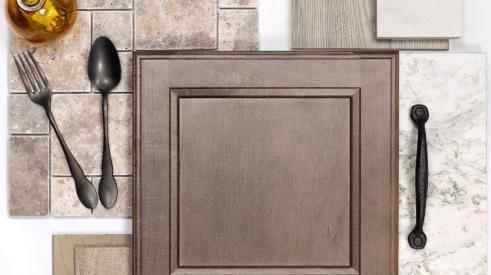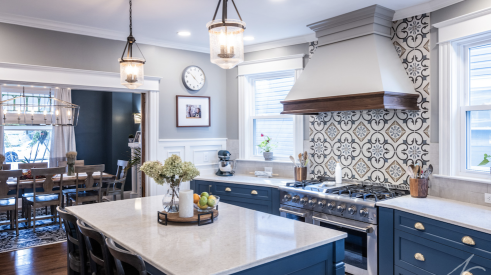“I’m about to sign a contract for a 15K bathroom remodel,” wrote a Reddit user on a personal finance thread two years ago. “I want to pay using a rewards card to rack up miles for an upcoming trip with my wife. What’s the best way to pay this large expense using a credit card when my contractor doesn’t accept credit cards? Thanks!”
Keeping It Simple
Reddit readers were quick to offer suggestions, with the original poster equally quick to reply. “Tell him what you’re trying to do and help you come up with a solution,” suggested one. That begs the question of whether or not it’s the contractor’s responsibility to figure out how the homeowner will pay for the work.
Another commenter suggested that the original poster ask his contractor to sign up for a Square account, one example of a mobile payment app. "It will cost him 2.75% per charge. But hey, it’s 2016 he should accept credit cards.” In response to this, another user points out “that would mean the contactor would eat over $400 in charges just so he [the original poster] could get his credit card perks. Contractor will get a good laugh if he asks, though.”
The thread ends with the original commenter explaining that the contractor he was using for his bath remodel did take cards at one time but had “stopped, since it wasn’t in demand from his customer base.”
Reasons They Don’t
Many contractors don’t take cards—neither credit nor debit. That would make more sense if what they sold cost less than $100 and could be conveniently paid for with cash. But a home improvement project typically starts at $2,000 or $3,000 and goes up, up, up from there. Often, it’s simply left to the homeowner to figure out how to pay for it.
Why would a business selling big-ticket items not accept credit cards? There are reasons. The first is administrative: It’s a hassle processing those payments and easier for business owners to take cash or a check.
“Business owners of contracting companies are extremely busy,” notes Builder Prime blogger Jonathan Weinberg. “It can take some time to get set up with the infrastructure or tools to accept credit cards, and they just never get around to it.” To accept card payments, the contractor would have to have the necessary and proper equipment—typically, a mobile device to swipe a card or read a chip in the field, since that’s where payment is often made.
The second reason, as noted in the Reddit dialogue, is expense. Sellers are charged 2-4% of the cost of the transaction in merchant fees by the banks that issue the credit cards.
Let’s take that $15K bathroom job. If that contractor did take cards, and the merchant fee is 3%, there’d be a $450 cost for accepting the card. Let’s say his net profit on the job is a standard 5%. That’s $750, and the merchant fee just ate up the greater part of it. He’s in the house for one to two weeks, and his profit for all that is $300?
A third reason is chargebacks. Let’s say the day he wrapped up that bathroom job and swiped the customer’s card with a mobile payment processor, the next-door neighbor wandered over to point out how shoddy and substandard the work was. The customer immediately gets on the phone with the credit card company and cancels the payment.
The contractor might fight it, but the stats indicate his chances of doing so successfully are not good. According to a 2016 report by the Federal Reserve Bank of Kansas City, “70% to 80% of chargebacks are resolved as merchant liability.”
Reasons You Should
By now you may be thinking: Why in the world would any contractor take a credit card? Actually, there are equally good, if not better, reasons to accept cards.
A top reason is convenience. “Most consumers don’t carry enough cash to cover a large expense and seldom use checks, but have at least one credit card in their wallet at any given time," according to business.com writer Lori Fairbanks. "Plus, rather than dropping off an envelope of cash or mailing a check, they can easily pay you in person, over the phone, or online ... Paying on credit cards can also help customers short on funds afford to have work done now, rather than waiting until they have the money in the bank.”
Let’s say we’re talking about a roof that’s shot to the point of leaking. By taking cards, you’re giving the customer that might not have ready cash a quick, convenient way to borrow the money they need to get the roof replaced.
A second reason is that, like it or not, this is now the way people prefer to pay for purchases. Preference has shifted, and continues to shift with time, according to personal finance writer Jason Steele. He cites a 2017 survey of 1,000 consumers who listed their payment preferences as follows: 44% preferred debit cards, 33% credit cards, and 12% cash.
A third reason is competitive advantage. When many contractors don’t take cards, you gain leverage in selling by providing options, credit cards, and financing among them. "While cash and checks may be preferable, since there are no fees associated with those methods of payment, allowing a customer to use a credit card could mean more business for you," writes Shanika Chapman on bizfluent.com. "You have a couple of options for accepting credit cards, including setting up a merchant account or using PayPal or Google Checkout. The fees will vary for each, so you will need to decide what works best for your business.”
Ways To Manage Card Use
But, you may be wondering, is there a way to avoid or absorb this expense? Here are two suggestions.
Calculate the percent of your business paid for with credit cards and financing, and build those fees into your gross margin and into your pricing. That’s how most retailers do it. Or, if you’re bothered by the idea that your cash customers are underwriting the convenience of your credit card customers, add a surcharge to your contract price that has your credit card customer paying the 2-4% merchant fee as a line item.
CardX marketing lead Evan Weese argues that this enables you to get the price you need to get on that job to maintain profit margins, while still allowing you to offer cards if you’re not already doing so. “By passing on the cost of credit card transaction fees,” he writes, ”small- and medium-sized businesses that had previously found card purchases too costly to process can now accept credit cards for the first time.”
Related Stories
10 Things To Consider As Part of Your Q3 Review
The third quarter is when you need to review your company’s performance and reevaluate plans for the rest of the year
The Power of Storytelling
Kelly Parker, the keynoter at the 2024 Women in Residential+Commercial Construction Conference, on the importance and difficulty of telling a simple story
6 Factors to Optimize Gross Profit
Thoroughly estimating and tracking gross profits is the life blood of a business, and one remodeler shares the strategies that have worked well for his firm
3 Areas Successful Remodelers Focus On
Industry advisor Mark Richardson shares what separates the losing from the winning in today’s market
Peppermill Finish
NAHB: Remodelers Face Challenges and Opportunities
Remodelers face a uniquely strong market yet remain challenged by codes and costs
The Neal’s Way Means Putting People First
For Neal’s Design Remodel, company culture is more than values on a wall. It’s everything.
Selling Your Company to Your Team
From company valuation to terms of the transfer, here’s a look at how three different remodelers made the deal work
NAHB Announces Action Plan for Housing Affordability
Six of the proposed 10 action items are important to residential remodelers












